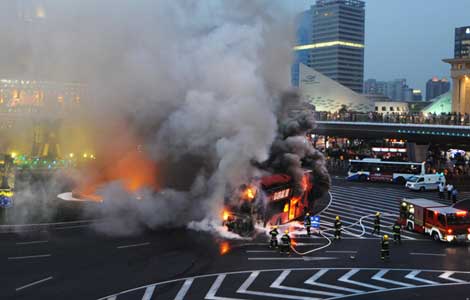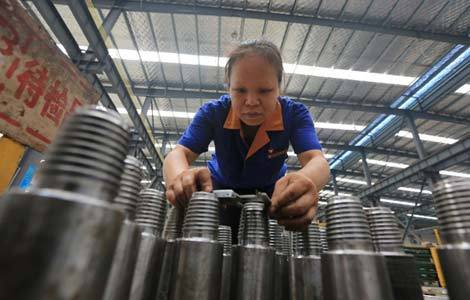China-US S&ED Outcomes of the Strategic Track
Updated: 2013-07-17 06:20
(Ministry of Foreign Affairs of PRC)
|
||||||||
At the Fifth Round of the China-US Strategic and Economic Dialogue (S&ED) July 10-11, 2013, in Washington, DC, Secretary of State John Kerry, special representative of President Barack Obama, and State Councilor Yang Jiechi, special representative of President Xi Jinping, chaired the Strategic Track, which included participation from senior officials from across both governments. The two sides held in-depth discussions on major bilateral, regional, and global issues and recommitted to the S&ED’s role in deepening strategic trust and expanding practical cooperation to build a new model of relations between the United States and China. The dialogue on the Strategic Track produced the following specific outcomes and areas for further cooperation. The United States and China:
I. Enhancing Bilateral Cooperation
1. High-level Exchanges: Recognizing the important role of high-level exchanges in the development of US-China relations, decided to further strengthen such exchanges between the two countries. The two sides reviewed the achievements of high-level exchanges since the fourth round of the S&ED, and underscored the constructive and successful meeting of President Obama and President Xi at Sunnylands, California in June. The two sides noted that upcoming multilateral meetings in 2013 provide further opportunities for high-level engagement between the two countries.
2. Strategic Security Dialogue: Held the third round of the Strategic Security Dialogue (SSD) July 9, 2013, and had a constructive, in-depth and candid exchange of views on a range of security issues of strategic importance to both countries. The dialogue was co-chaired by Deputy Secretary of State William J. Burns for the United States and Executive Vice Foreign Minister Zhang Yesui for China, who were joined by Under Secretary of Defense for Policy James Miller, Deputy Chief of the PLA General Staff Lieutenant General Wang Guanzhong, and others from the relevant departments of the two countries. Commenting positively on the growing importance of the SSD and the establishment of a Cyber Working Group under the SSD, the two sides decided to engage in deeper and more sustained dialogue on these issues and to establish a stable and cooperative strategic security relationship. The two sides decided to hold an informal round of the SSD later this year.
3. Cyber Working Group: Welcomed the first meeting of the Cyber Working Group (CWG) under the SSD, and commented positively on the candid, in-depth, and constructive dialogue. The two sides had an in-depth discussion on issues of mutual concern and decided to take practical measures to enhance dialogue on international norms and principles in order to guide action in cyber space and to strengthen CERT (Computer Emergency Response Team) to CERT coordination and cooperation. The two sides will also discuss additional cooperative measures in future meetings. Both sides recognized the CWG as the main platform for bilateral talks on cyber issues, agreed to have sustained dialogue on cyber issues, and agreed to hold the next meeting by the end of this year.
4. Military-to-Military Relations: Committed to strengthening the military-to-military relationship and to make efforts to raise the relationship to a new level, including by reaffirming the visit to the United States by China's Minister of National Defense in 2013 and a reciprocal visit to China by the U.S. Secretary of Defense at a mutually convenient date in 2014. Decided to actively explore a notification mechanism for major military activities and to continue discussions on the rules of behavior on military air and maritime activities, including at the next Military Maritime Consultative Agreement (MMCA) plenary.
5. Hotlines between the Special Representatives of the Presidents: Decided to establish a hotline between the Special Representatives of the Presidents, in order to facilitate communication.
6. Human Rights Dialogue: Affirmed their commitment to continuing constructive bilateral dialogue on human rights and decided to hold the next round of the Human Rights Dialogue July 30-31, 2013.
7. Legal Experts Dialogue: Affirmed that legal cooperation and exchanges are in the interest of both countries and decided to continue joint efforts to advance the rule of law in their countries. In this context, they decided to hold the next round of the Legal Experts Dialogue November 7-8, 2013.
8. Nonproliferation Cooperation: Affirmed their intention to enhance communication and cooperation on nonproliferation, arms control, and other major international security issues on the basis of mutual respect, equality, and mutual benefit. The two sides noted the improvements in our bilateral cooperation on nonproliferation in the past year. They acknowledged the importance of cooperation in preventing the proliferation of weapons of mass destruction and missile technologies as called for by United Nations Security Council resolutions and reiterated that this cooperation represents an important part of our overall bilateral relationship. Both sides called for developing a road map for strengthening future cooperation.
9. Security Dialogue: Since renewing the Security Dialogue (SD) last year, the two sides have held two rounds, most recently in June, where they discussed strategic security, multilateral arms control and regional issues. At the last round of the SD the two sides acknowledged the importance of regular dialogue on these issues, and decided to hold the next SD prior to next year’s S&ED.
10. Counter-Terrorism Consultation: Decided to hold the US-China Counter-Terrorism Consultations at the vice ministerial level in due course.
11. Consular Dialogue: Held the Consular Dialogue May 16, 2013, in Washington, DC, and decided to hold the next round in 2014.
12. CNCERT/CC and US-CERT Consultation: Decided to hold consultations between the National Computer Network Emergency Response Technical Team/Coordination Center of China (CNCERT/CC) and the United States Computer Emergency Readiness Team (US-CERT) to enhance cooperation between the two entities.
13. Law Enforcement Cooperation: Decided to continue efforts to deepen and improve law enforcement cooperation to address issues of mutual concern, especially through the Joint Liaison Group on Law Enforcement Cooperation (JLG). In accordance with discussions at the tenth plenary session of the JLG in Guangzhou in December 2012, the two sides decided to identify fugitives and asset recovery, counternarcotics, firearms smuggling, intellectual property rights, cyber crime, and child pornography as priority areas in the coming year; to work together on law enforcement responses; and to hold the eleventh plenary session of the JLG in Washington, D.C., in late 2013. The two sides also decided to increase cooperation on efforts to reduce demand for illicit drugs in the Asia-Pacific. The two sides decided to continue to discuss combating corruption, transnational bribery, and other illicit trade and business practices under the eighth meeting of the JLG under the Anti-Corruption Working Group that will be held in the second half of 2013. Both sides are to enhance communication in the field of anti-corruption under multilateral frameworks, such as G-20, UNCAC, and APEC. The United States announced its support for China’s hosting the 2014 APEC Anti-Corruption Working Group meeting and other relevant activities. Both sides reaffirm their G-20 commitments on tackling foreign bribery, denial of safe haven, and asset recovery.
14. Coordination between ICE and GACC: Decided to conduct enforcement cooperation between the US Immigration and Customs Enforcement (ICE) and the General Administration of China Customs (GACC) against cash smuggling, drug smuggling, and other contraband movement.
15. CBP-China Customs Container Security Initiative: The US Customs and Border Protection (CBP) and the General Administration of China Customs (GACC) decided to enhance cooperation on US-China Container Security Initiative (CSI). Both sides intend to discuss the issue of deployment of China Customs CSI officers at US ports within the parameters of current Declarations of Principles.
16. Travel Documents Bio-Metrics: Affirmed the intention of DHS and the MPS Bureau of Exit-Entry Administration (BEEA) to continue the exchange of best practices in the use of biometrics in travel documents used at points of entry.
17. Joint Fisheries Enforcement: Marked 20 years of the US-China partnership established in recognition of mutual concerns regarding the damaging exploitation of living marine resources through the use of high-seas drift nets. Since the partnership’s inception, 81 Chinese officers have sailed with the US Coast Guard, and this highly successful cooperation has led to 18 interdictions and enforcement actions against vessels fishing in violation of the High-Seas Drift Net Fishing Moratorium. The US Coast Guard and the National Oceanic and Atmospheric Administration (NOAA) Fisheries Service look forward to again welcoming enforcement officers from China Fishery Law Enforcement Command to join US Coast Guard cutters in patrolling the Pacific Ocean during the summer of 2013. In addition, the two countries made good progress in taking joint measures to combat illegal, unreported, and unregulated (IUU) conducts in the high seas of North Pacific.
18. Maritime Security Cooperation: Expressed support for carrying forward the US-China Maritime Safety Dialogue by the United States Coast Guard and China Maritime Safety Administration. The two agencies, having held a working-level meeting on cooperation of maritime safety in April, decided to meet in September 2013 to discuss technical cooperation and exchanges in maritime radio navigation and satellite navigation, particularly in maritime application of Beidou and other global navigation satellite systems.
19. CBP-China Customs Action Plan on the Supply Chain Security: Have completed 200 joint validations in China, started discussions of the mutual recognition of the Authorized Economic Operator (AEO), and seek to conduct more joint validations before the end of 2013 in China, with the possibility of additional joint validations in 2014 and 2015. In addition, Customs and Border Protection and the General Administration of China Customs seek to align their respective Authorized Economic Operators (AEO) by conducting further analysis of the comparison of the minimum security criteria and on-site validation observations of both programs.
20. Joint Customs Training: Signed an Action Plan to facilitate the exchange of best practices, explore joint operational exercises, and strengthen customs-to-customs cooperation to identify and interdict illicit materials traveling via air and maritime cargo. The two sides noted the successful implementation of courses relating to seaport cargo interdiction and targeting and risk management, and intend to continue implementing the Action Plan and organizing the training courses based on the results of the joint evaluation.
21. China Garden: Reaffirmed their support for the National China Garden Foundation’s efforts to construct a China Garden at the U.S. National Arboretum. Both sides are striving to complete the China Garden project design, consultation, fund-raising, and bidding procedures as soon as possible. The construction of the China Garden will begin after these construction assessments have been completed and adequate funds have been raised. The two sides held a Joint Working Group during the 5th S&ED.
22. Breakout Sessions and Bilateral Meetings: Decided to establish International Economic Affairs consultation and Legal Advisers Consultation between the US Department of State and Ministry of Foreign Affairs of China. Decided to hold the next rounds of sub-dialogues on Policy Planning, Africa, Latin America, South Asia, and Central Asia on a timely basis and to enhance bilateral coordination and cooperation on regional and international issues. Held breakout sessions on the margins of this year’s S&ED on the subjects of peacekeeping, South Asia, Latin America, wildlife trafficking, customs, and other issues. Conducted a series of bilateral meetings between senior officials on a broad range of issues in the US-China relationship.

 Free on his feet
Free on his feet
 Extreme heat causing vehicle fires
Extreme heat causing vehicle fires
 Men, you look good in slim elegant cut
Men, you look good in slim elegant cut
 Luxury dresses in plastic
Luxury dresses in plastic
 Obama urges restraint amid protests
Obama urges restraint amid protests
 Putin wants Snowden to go, but asylum not ruled out
Putin wants Snowden to go, but asylum not ruled out
 Apple to probe death of Chinese using charging iPhone
Apple to probe death of Chinese using charging iPhone
 Investment falters as industrial activity flags
Investment falters as industrial activity flags
Most Viewed
Editor's Picks

|

|

|

|

|

|
Today's Top News
Premier highlights economic restructuring
Baidu to acquire biggest app store
China signs co-op pact with Belarus
Studies using humans must be registered
Summer heat leaves cities gasping
River polluters handed prison terms
Ministry plans to beef up investment
Drivers lose out on fee hike
US Weekly

|

|





